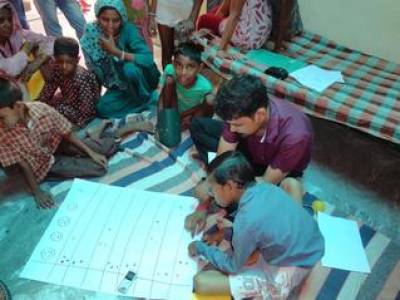Ask us too!: Hearing the voices of children and young people (CYP) with disabilities living in poverty in South Asia

Project Summary
This pilot project set out to explore the use of participatory methodologies with disabled children living in India and Sri Lanka, in order to gain their own perspectives about their lives and with a particular focus on poverty and social exclusion. In addition we wanted to pilot a semi structured interview about poverty and social inclusion with their parents.
The pilot studies were carried out in collaboration with local (Indian and Sri Lankan) NGO and university partners with whom we had pre-existing working relationships, which we wanted to cement, in order to plan to work with them on the main study subsequently.
Disabled children in rural and urban India and Sri Lanka were invited to 'children's meetings' to do activities which would encourage them to talk about their priorities and concerns. 4 meetings in each country were held with between 3-6 children in each group. The participatory methods used included adaptations for children with physical, learning, hearing and visual difficulties. Children with a range of difficulties and aged 8-18 were involved, all enjoyed the meetings and were keen for more of such events to take place. They valued having their opinions sought and expressed a range of interesting and sometimes surprising views.
An interview schedule for parents was piloted, particularly focussing on their experiences of having a disabled child, on social inclusion in their community, on availability of resources and the financial impact of their situation. Project partners were NGOs working in the disability arena and local university colleagues. NGO staff and postgraduate students were trained as research assistants and were involved in a range of stages in the research process.
The pilot project therefore provided a proof of the concept and feasibility of the study. Further fine-tuning and modification of the study design, methods and interview schedule will be needed before the main study. The broad idea is to run a series of children's meetings over some weeks or months, in order to include more disabled children, and gain their perspectives in depth on a number of aspects of their lives. The parents' interview would include more specific questions about household expenditure in order to explore their financial and esource situations further. Comparative data would also be collected from nondisabled children and their parents, in order to investigate whether families with a disabled child are, as is often suggested anecdotally significantly poorer than others in their community. This would contribute to filling a currently recognised gap in knowledge about the relationship between disability and poverty, particularly in low income settings.
A conference presentation, various lectures to students, a journal article and a book chapter have reported the pilot project, focussing mainly on the methodological issues, as the data collected so far is very preliminary. 2 applications for funding of the main study have been submitted but have been unsuccessful so far, we preparing for further funding applications. Some of the ideas and methodologies have been incorporated into a larger programme grant about disability with other colleagues at UCL.
 Close
Close

